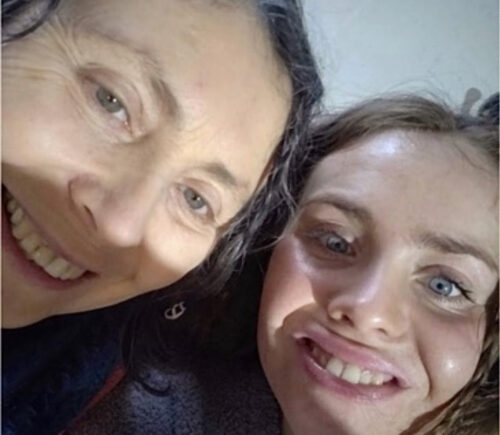This blog has been written by Rosario, a carer for her Mum who has schizoaffective disorder. She shares her personal experience, including some tips and advice for others in similar situations. Thank you to Rosario for sharing this with us.
*Trigger warning – mental health, suicide, crisis, psychosis.
Caring for someone with schizoaffective disorder – my experiences and thoughts:
I wanted to raise awareness about schizoaffective disorder and what it is like to care for someone with this condition, partly due to the lack of personal accounts and confusion expressed by people in my life. I hope this will be helpful for people who don’t know much about this illness, for those who are carers to feel less alone and for family members, friends, employers, and teachers of someone who is a carer of a loved one with schizoaffective disorder.
What is schizoaffective disorder?
‘Scitzo’ refers to symptoms of psychosis and ‘Affective’ refers to mood symptoms. It is a separate diagnosis but shares symptoms of Schizophrenia and Bipolar. Symptoms include delusions and hallucinations which can be visual or manifest as hearing voices to give two examples. Delusions are another symptom which includes holding beliefs that others do not share and paranoia. Mood symptoms include depression and suicidal feelings and mania.
About me and my caring role and its impact
I am in my 20s and help my father care for my mother, I balance this with a full-time job at Bipolar UK. I wanted to work in this field to make a difference to people like my mum. Caring for her can involve helping with practical things like chores, managing medication, advocating for her, liaising with doctors and nurses, giving emotional reassurance, picking up on signs that this is needed and being non-judgemental.
My mother has had schizoaffective disorder since she was very young and has been ill all my life, things were particularly bad when I was little but got somewhat better when I was in secondary school and started university, my father and I hoped she was on the way to recovery. In my second year of university, my Mum had a psychotic episode and became very ill and was placed in a hospital in London, not near me or my father. Since then, she has had three psychotic episodes, the most recent one began this month. Throughout this, my studies at university were disrupted and I was worried I wouldn’t be able to carry on. Thanks to discovering about my local carers centre Carer Support Wiltshire who supported me, I attended workshops, met other young people in my situation and had a member of the team check in on me regularly. They also provided me with evidence of my mother’s illness and my caring role for my university which meant I was able to complete my master’s degree. This gave me hope for the future.
What has helped me
I then became part of the Carers Trust and Quilter steering group which was life-changing. I was able through the group to meet other young adult carers on Zoom during the pandemic. Through this group I was able to help shape ideas for Carers Trust and develop ideas on how to better support young adult carers and express experiences through podcasts, blogs and social media and meet MPs among many experiences. A video I made was seen by a major donor and ambassador of the charity who asked to help fund counselling for me, I was so moved to be supported in this unexpected act of kindness it gave me hope, the councillor is a wonderful person who has allowed me to have a monthly session this has been a lifeline. Without counselling and opportunities to raise awareness like this blog, I would feel incredibly alone. Another opportunity that arose directly from being a part of the Carers Trust steering group was being asked to be the youngest trustee at Carers Support Wiltshire. Thanks to these experiences I built the confidence and skills to pursue a career in the charity sector and give back when I have received a lot.
The reality of mental illness
Recently, my mother’s health deteriorated rapidly leading to incidents where due to her illness she ended up in situations that put her at risk that could have risked her life. It caused me so much anxiety and I felt and continue to feel helpless. This is partly because there weren’t beds available in mental health wards. My father and I were looking after my very vulnerable and unwell mother and didn’t have the resources to prevent a crisis from happening despite watching her and being there to support her, we were aware things could escalate badly and it did. She went missing due to her illness making her very paranoid but luckily after alerting the police, she was found and eventually was given a bed in a mental health ward, though not close to us.
It is incredibly difficult knowing that it takes several crises to happen before something can be done and my mother can be admitted to hospital, only after there is increased risk to the patient or others and not before crisis point. This experience, from even before the start of a crisis, with the build-up of stress from maintaining a stable situation with someone who is never far from the edge of illness to the beginnings of a crisis, to it happening and in my family’s case recently and in the past not knowing whether she will survive during a crisis to hospitalisation which takes months (the longest for my mother just under a year) takes an enormous toll.
Working while caring
Something that has helped me a lot recently is my work understanding how distressing this situation is and was impacting my mental health. I was given compassionate leave and though I am still struggling to juggle everything it gave me the chance to breathe and process everything as well as support my family. I was able to be confident enough to open up to my work due to my past support from Carer Support Wiltshire and my involvement with Carers Trust. This has made me realise what a difference these organisations can make, I am also fortunate that my current employer understands, and other employers and education centres could take note. Things are hard but I feel a bit more able to get through it. For me, two key factors in coping are the support and understanding of others and the chance to practice self-care.
Things I have found helpful that could help you as a carer of someone with a mental illness:
- Make an appointment with your GP to discuss the impact caring has on you. I was signposted to a social prescriber who let me know about free classes in my area for carers and they may be able to signpost you to different kinds of support including free or subsidised counselling (although there are often long waitlists).
- If your cared for is showing signs of becoming unwell contact their mental health nurse who works most closely with them, and if the situation is getting worse contact your local crisis/intensive team.
- This may not be widespread knowledge but if your cared for is in a crisis the police are the emergency service that deals with these kinds of situations, not the ambulance service, so when calling 999 in an emergency, ask for the police.
- If you feel able to, open up to friends, family, teachers, lecturers, employers, or anyone who may be in a position to help if they understand your situation. They are better able to support people when they know the situation you are in.
- Your local carers centre may have events and opportunities to get out and meet other carers that are worth also exploring their newsletters, websites and social media may be incredibly useful. Find our What’s On page here.
- Do things you enjoy that will make you feel better if you have the chance to. This could be walking in fresh air, eating something nutritious, having your favourite meal, messaging, calling a friend or meeting in person, spending time alone reading a book or watching a film. Time for you matters, caring can be all-consuming. Remember it’s also okay to not do much if you are feeling overwhelmed and tired, you deserve to rest.
Tips for friends, family members, teachers, employers, and others in the life of someone who cares for someone with schizoaffective disorder or other mental illness to provide better understanding and support:
- Learn about schizoaffective disorder so you have a better idea of what it’s like for both carer and cared for in this situation, the charities Mind and Re-Think Mental Illness have resources on schizoaffective disorder on their website
- Check-in and let them know you care and are there for them and do so regularly, even if at times they may not be able to respond or meet up knowing someone is there makes a big difference.
- Make it about them, caring for someone with a mental illness can be very lonely and isolating even if they seem ok, listen and let them talk and allow them to open up about their situation as they might not often be allowed to speak about their struggles for fear of burdening others or being misunderstood.
- Try not to judge, from my own experience this illness can be at times inexplicable and doesn’t fit societal norms, acceptance of the carer and their cared is powerful.
- Doing small practical things such as offering to do a food shop for them, helping them with some DIY, making them a cup of tea and offering to chat or bringing them a treat can make a real difference. Young carers may be juggling school, university, or work and caring or may have to give that up due to the intensity of caring. Older carers may be struggling with their own health issues.
- Employers, teachers, and lecturers please do not assume if a carer is slow on an assignment or deadline that they are lazy, check what is going on for them and be flexible. Give them the chance to show you that with extra support and acceptance of their situation, they can achieve incredible things and deserve the chance to do so, as it shows incredible resilience to care for someone and pursue other goals given how demanding caring can be.
Find mental health helplines and resources here. You can also call us FREE for information, advice and support on 0800 181 4118, or email admin@carersupportwiltshire.co.uk
Remember to always call 999 in an emergency.





